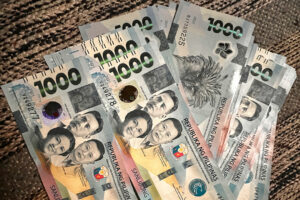THE BUREAU of the Treasury (BTr) on Tuesday fully awarded Treasury bills (T-bills) at lower rates after dovish signals from the Philippine central bank.
Signals of 75 basis points (bps) in additional policy rate cuts this year from the Bangko Sentral ng Pilipinas (BSP) were mostly due to April inflation of 1.4%, the slowest in more than five years, Michael L. Ricafort, chief economist at Rizal Commercial Banking Corp., said in a Viber message.
That and global crude oil prices still lingering at four-year lows would support benign inflation that “help justify future BSP rate cuts that could also match future Fed rate cuts,” he added.
The Treasury raised P25 billion as planned at an auction as total bids reached P70.345 billion, almost thrice the amount on offer, with the temporary trade truce between the US and China failing to dim the appeal of safe-haven Treasuries.
The Treasury borrowed P8 billion via 91-day T-bills as tenders reached P23.375 billion. The three-month paper was quoted at an average of 5.546%, 2.7 bps lower than a week earlier. Tenders accepted by the BTr had yields of 5.5% to 5.572%.
The government also fully awarded P8-billion in 182-day debt as bids hit P29.335 billion. The average rate of the six-month T-bill was 5.65%, 1.7 bps lower than in the previous auction, with accepted rates at 5.623% to 5.668%.
The BTr raised P9 billion from 364-day debt as demand hit P17.635 billion. The average rate of the one-year T-bill fell 4.2 bps to 5.655%, with bids accepted having yields of 5.54% to 5.72%.
On the secondary market before Tuesday’s auction, the 91-, 182- and 364-day T-bills were quoted at 5.5227%, 5.6708%, and 5.7152%, based on PHP Bloomberg Valuation Service (BVAL) reference rate data provided by the Treasury.
T-bill rates fell on lingering market uncertainty about the US and China’s trade truce, a trader said by telephone.
“Markets are not sure about the details of the trade talks. Rate was a little lower than market expectations,” the trader said.
For the next 90 days, the US and China agreed to drop extra tariffs imposed on each other after trade talks Geneva, Switzerland at the weekend.
On Monday, the US said it would lower the tariffs on Chinese goods to 30% from 145%, while China would cut levies on US products to 10% from 125%.
The Monetary Board last month resumed its easing cycle after an unexpected pause in February, cutting benchmark rates by 25 bps to 5.5%. Its next meeting is on June 19.
Philippine inflation slowed to an over five-year low of 1.4% in April from 1.8% in March and 3.8% a year earlier. For the first four months, it averaged 2%, at the low end of the BSP’s 2-4% annual target.
On Wednesday, the government will sell P40 billion from two reissued T-bonds — P15 billion in seven-year notes with a remaining life of two years and 11 months and P25 billion in 20-year debt with a remaining life of 19 years and 13 days.
The Treasury is looking to raise P260 billion from the domestic market this month — P100 billion via T-bills and P160 billion through T-bonds.
The government borrows from local and foreign sources to help fund its budget deficit, which is capped at P1.54 trillion or 5.3% of gross domestic product this year. — Aaron Michael C. Sy

